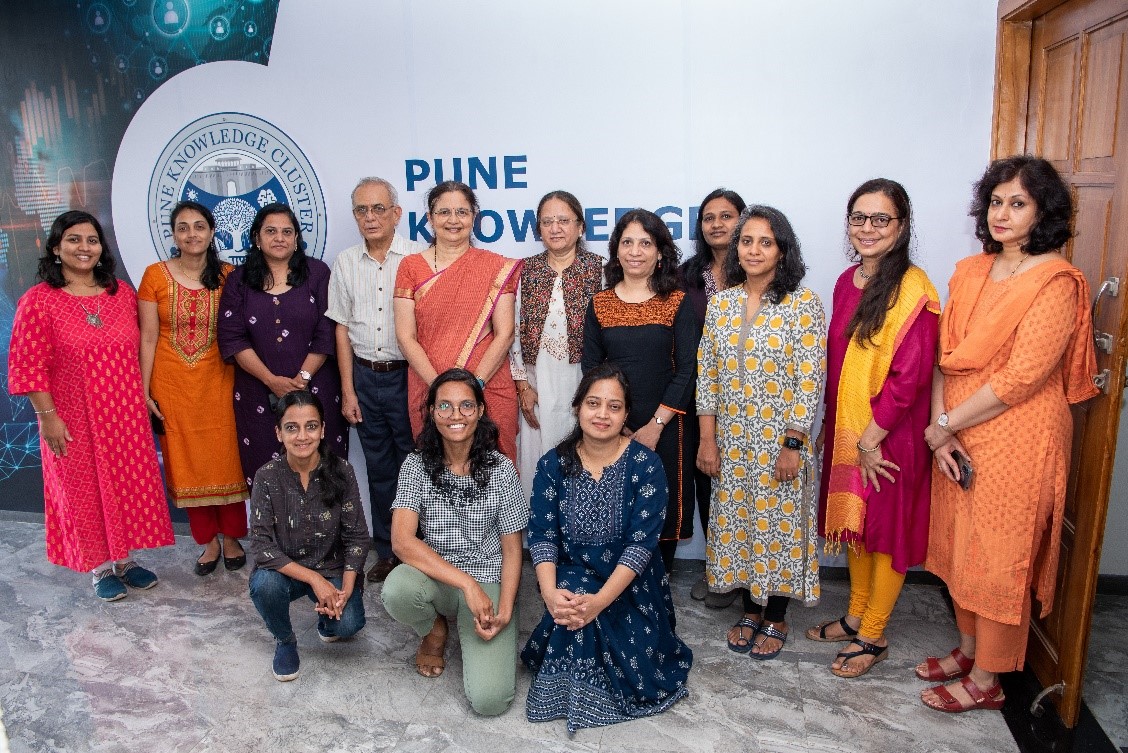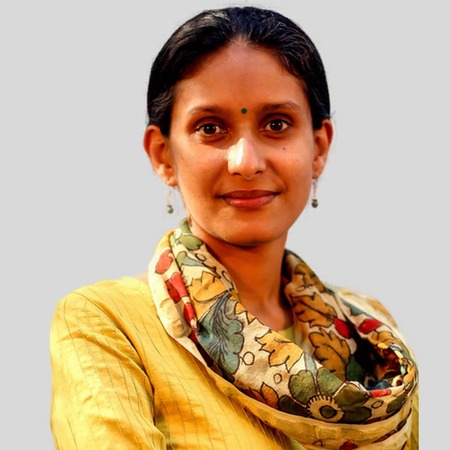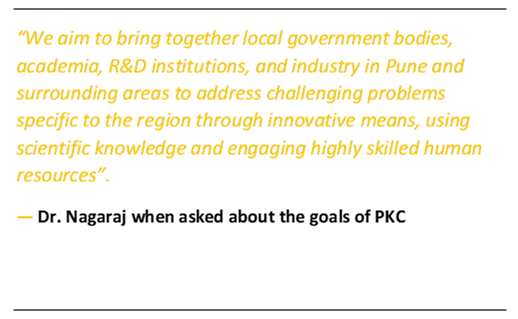
- A+
- A
- A-

Top (Left to Right): Gayatri Kshirsagar, Ashwini Keskar, Prachi Pasalkar, Ajit Kembhavi, Anita Kane, Rashmi Urdhwareshe, Shilpa Jain, Poornima Sangewar, Priyanki Shah, Anupama Harshal, Manjari Desai. Bottom (Left to Right): Shraddha Gargatti, Disha Sawant, Preeti Nema
Image credit: Pune Knowledge Cluster
The Pune Knowledge Cluster, PKC in short, is one of six city clusters that are a part of the PSA Office’s Science and Technology Clusters’ initiative. The Pune cluster is anchored at the city-based Inter-University Centre for Astronomy and Astrophysics (IUCAA). We spoke to Dr. Priya Nagaraj, who is the first Chief Operating Officer (COO) of PKC.

Dr. Priya Nagraj
During her stint with the deep-tech startup ecosystem with Venture centre, Pune, and Deshpande Startups in Hubli, Dr. Nagaraj’s interactions with entrepreneurs helped her learn the nuances of multitasking, operating with minimal resources, raising and managing funds, and recruiting good human resources, all of which is in alignment with her new role. Her experiences prepared her well to handle uncertainties, be open to new ideas and be able to take constructive criticism. These, she believes, will help her sail through her new journey. In this interview, she talks about the cluster’s goals, focus areas in the context of national science and technology missions, her experience of working with the local government and industry, and what it means to be a woman leader in STEM.
The five focus areas at PKC
The Pune cluster is focusing on five interlinked areas: health, sustainability and environment, sustainable mobility, big data analytics, artificial intelligence, and capacity building including that in STEM education. The needs, and existing scientific and technological capabilities, of the city went on to be PKC’s guiding principles. And alignment with those priorities ensures interest and commitment from the partner organisations, and thus improves the chances of actual ground implementation. “Thought leaders and stakeholders who have seen the city grow over the years came together to decide the areas PKC will work on,” says Dr. Nagaraj.

First steps: creating a framework
PKC has analysed problems in and around the city using a data-driven approach. Dr. Nagaraj shares, “We used available data to map and analyse why certain solutions did not work before we decided to invest time and resources in proposing and building new solutions via the cluster. We believe that this will be important for policy recommendations in the long run.”
PKC is soon to be registered as a Section 8 company to allow operational flexibility and foster smooth involvement of industries, research organisations, and industry bodies to enable a participatory approach while addressing local issues. Collaboration requires a shared understanding of issues and so, bringing multiple stakeholders on board is a challenge at times.
“Timely alignment of all partners in committing to activities for the well-being of a City in terms of time, resources, and capabilities does not necessarily always match. Managing this well can save a valuable amount of time. Working with multiple stakeholders requires patience, an open mind, and wisdom to be able to collect opinions from different partners and be able to meaningfully distill these inputs and channel them to achieve constructive outcomes.
—Dr. Nagaraj when asked about what her learnings were in her current role.
National missions at the Core of PKC activities
PKC has partnered with the Delhi science and technology cluster’s Delhi Effective Education and Pedagogy Cluster (DEEP-C) to develop and implement STEM programs in alignment with the National Education Policy 2020 (NEP 2020). The goal is to create a multi-city ‘Centre of Excellence’ for STEM with focus areas such as augmenting digital literacy, teachers’ training for digital pedagogy, gamification for learning, developing and imparting sustainability skills to students, and setting up STEM labs.
Talking about the initiatives concerning the Green India Mission, National Biodiversity Mission, and nationally-determined contributions to the United Nations Framework Convention on Climate Change (UNFCC), Dr. Nagaraj says, “We want to build climate resilience for the city of Pune through our sustainability and environment vertical. We have programmes for increasing the vegetation cover by developing sustainable plantation models based on vegetation interactions studied in natural forests.” The resultant increase in vegetation cover will not be random but will contribute to carbon sequestration, biodiversity, and increased livelihoods.
Working with the local government and industry
Dr. Nagaraj mentions that local bodies have data, but it is not adequately organised for appropriate utilization in decision-making. PKC started working with the Pune Municipal Corporation (PMC) for Pune Smart City on digitising tree census’. The census is currently done manually without much technology intervention. PKC is helping the municipal corporation organise and collect data in a faster and more efficient way to create a digital resource that would enable analytics to understand historic changes in tree populations and enable predictions on achieving the current goals of carbon sequestration.
Industries are increasingly seeing value in funding technology development, piloting, and deployment, which is ‘kind of the second generation of CSR thinking’. Dr. Nagaraj feels that the role of the PSA Office in providing insights on industry philosophies for CSR funding and access to relevant networks to explore various funding opportunities has been crucial.
On career shifts, women leadership, and professional experiences
Dr. Nagaraj agrees that woman leaders have to put in extra effort to get the desired recognition and acknowledgement. She feels women must not underestimate their capabilities and play down their knowledge and skills. Further, the number of good mentors who promote and support women leaders is low; Dr. Nagaraj admits how she missed having a good mentor for getting guidance and support.
“The journey should not be lonely; it should be supportive and we have to make a conscious effort as a community to make sure that this happens”
—Dr. Nagaraj on support for women in industry
Dr. Nagaraj is optimistic about the future of women leaders and shares, “Recently both the private and government sectors have embraced policies to increase women’s representation in senior management and decision-making bodies”. She mentions the STIP policy recommendations on supporting women by giving dual recruitment policies, flexible working hours, adequate parental leave, and childcare support. She is positive that if such transformation happens in a top-down manner, it will trickle down and result in a significant transformative change.
Dr. Nagaraj has had an interesting career trajectory, from being a researcher, to joining the pharma industry, moving on to a startup ecosystem, and building and harnessing capacities in science and technology. Dr. Nagaraj feels that for a researcher to change career trajectories, building diverse and versatile skillsets is extremely important. She emphasizes that skills in management, communication, financial management, and networking impart confidence and can ensure success. “It takes time to find something that you enjoy doing. Very often, the only way to find out is to hold your breath, take the plunge and find that you can swim.”
Pune Knowledge Cluster and their work.
Adita Joshi is a science education and communication consultant, and a freelance science writer.




